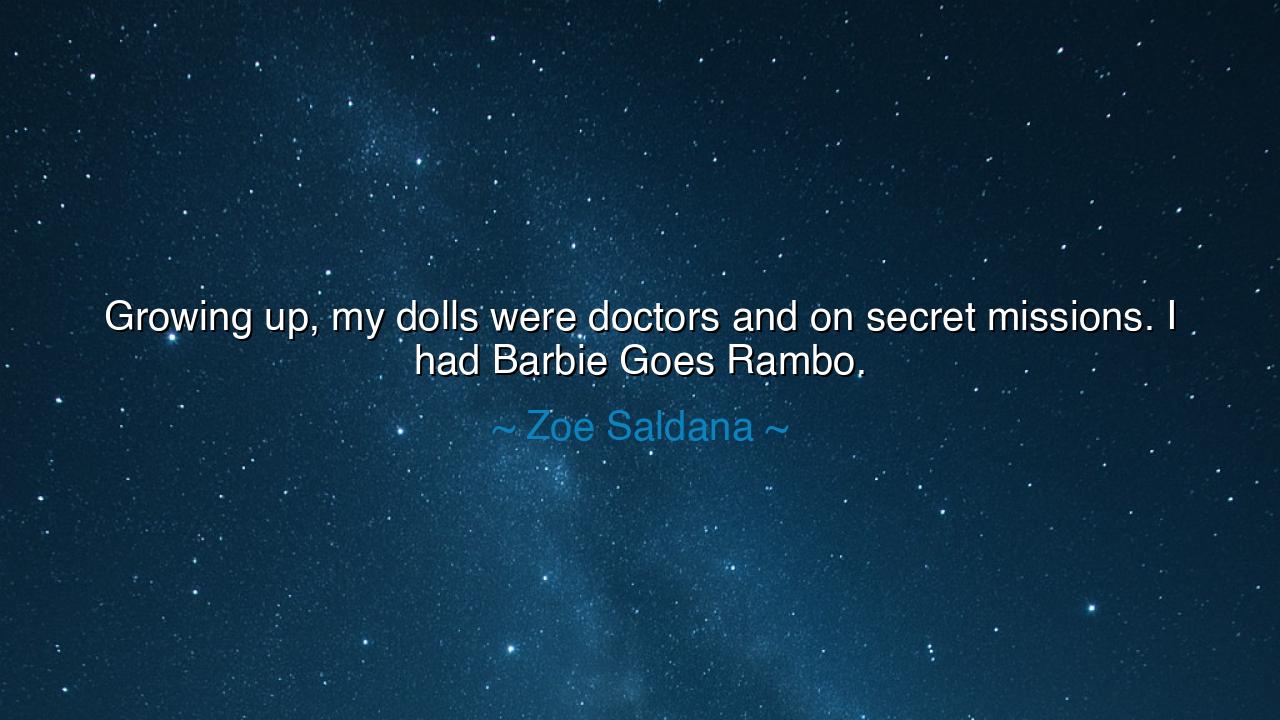
Growing up, my dolls were doctors and on secret missions. I had






Hear now the spirited words of Zoe Saldana, who declared with both playfulness and vision: “Growing up, my dolls were doctors and on secret missions. I had Barbie Goes Rambo.” In this utterance, though light in tone, we find a revelation of the human spirit’s imagination, and a challenge to the limits that society would place upon a child’s dreams. For in the world of her play, the doll was not confined to beauty and vanity, but became healer, warrior, adventurer—an emblem of courage and service.
The meaning of this quote shines brightly: it is the power of imagination to transform symbols. Where others saw in the doll merely a shallow reflection of appearance, Saldana breathed into it new life, new roles, and new missions. She did not accept the narrow script written for her toys; she forged a new story of strength, bravery, and compassion. In this way, she reveals a truth the ancients knew well—that the tales children tell in their play often shape the paths they walk in life.
In history, we see this echoed. Consider the tale of Joan of Arc, a simple peasant girl who, from visions and dreams, imagined herself a warrior for God and country. Though no sword was meant for her hand, and no armor for her frame, she refused the confines of expectation. Like Saldana’s Barbie Goes Rambo, she recast the role of womanhood in the language of valor and mission. And though her end was tragic, her legacy burned so brightly that centuries later she was remembered as a saint and heroine.
Saldana’s words also speak to the resilience of the spirit when confronted with limitation. Dolls, toys, and the stories that surround them are often crafted to enforce society’s narrow view of gender or worth. But she, in her childhood play, bent them to her own vision. A doll became a doctor—a bringer of healing. A doll became a soldier—a fighter on secret missions. Through this reimagining, she teaches that nothing need remain as it was given to you; the world itself may be reshaped by imagination and courage.
There is also humor in her saying, and this too carries wisdom. By laughing at the idea of “Barbie Goes Rambo,” she disarms the seriousness with which society enforces its boundaries. The ancients knew the power of laughter—it undermines fear, it breaks chains, it reminds us that even the heaviest constraints can be mocked and overturned. In her words, play becomes prophecy, laughter becomes liberation.
The lesson is clear: do not accept the roles that others write for you. Take the tools given into your hands, even if they are simple or small, and reforge them into instruments of your own vision. Whether it be a doll, a desk, or a destiny—make it your own. As Saldana did with her toys, transform the ordinary into the extraordinary, and let your imagination carry you into places the world says you do not belong.
And so, let your actions follow. Encourage the children around you not merely to play, but to imagine without limits. In your own life, revisit the symbols and stories that bound you, and dare to rewrite them. If your doll was once meant only to smile, let it heal. If your story was meant only to serve, let it conquer. For within imagination lies the seed of all transformation.
Thus remember Zoe Saldana’s wisdom: “Growing up, my dolls were doctors and on secret missions. I had Barbie Goes Rambo.” For though spoken in jest, it reveals a heroic truth: the power to redefine the world begins in how we imagine it. And those who dare to imagine boldly, even in play, will one day live boldly, and inspire others to break free from the cages of expectation.






AAdministratorAdministrator
Welcome, honored guests. Please leave a comment, we will respond soon